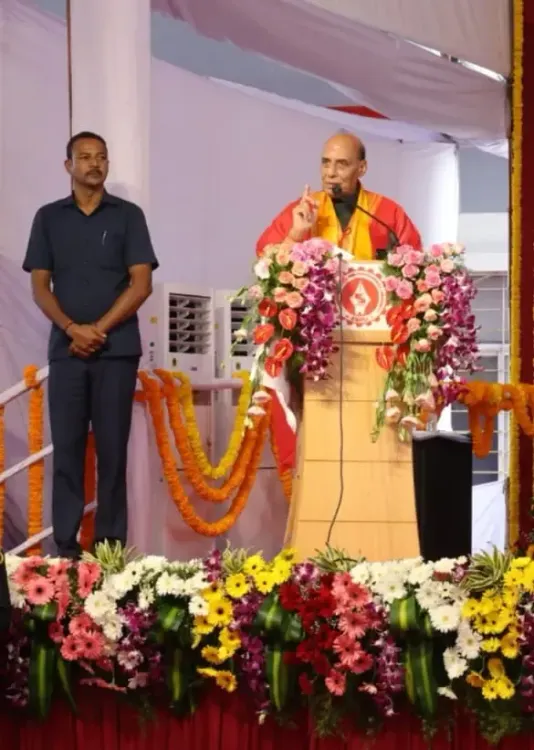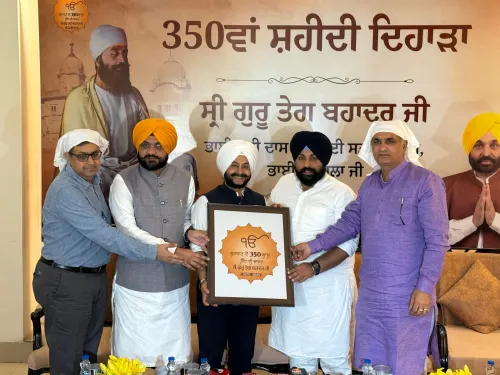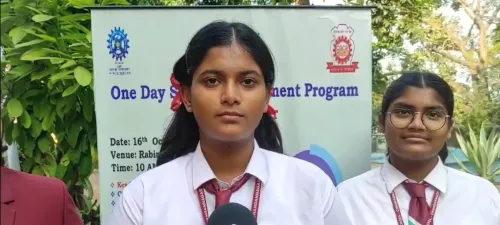How Did Operation Sindoor Become a Symbol of India's Self-Reliance?

Synopsis
Key Takeaways
- Operation Sindoor symbolizes India’s self-reliance in defence.
- India's defence production has significantly increased in recent years.
- Skill development is essential for empowering the youth.
- Educational institutions are pivotal in training skilled professionals.
- Initiatives like Skill India are crucial for future progress.
Pune, Oct 16 (NationPress) Defence Minister Rajnath Singh stated on Thursday that Operation Sindoor represents a remarkable milestone in the nation’s journey towards self-reliance, with the Army demonstrating courage through the use of indigenous weapons.
“The youth of India have made significant strides in the manufacturing of defence equipment. Over the past decade, the production of our defence equipment has surged from Rs 46,000 crore to Rs 1.50 lakh crore, with the private sector contributing approximately Rs 33,000 crore. Our goal is to expand production capacity to Rs 3 lakh crore and achieve exports worth Rs 50 lakh crore by 2029,” he remarked during the sixth convocation of Symbiosis Skills and Professional University.
“India has consistently conveyed the message of 'Vasudhaiva Kutumbakam' through its actions. As the nation strives for self-reliance in defence, institutions like Symbiosis are dedicated to nation-building alongside education. The graduates will be responsible for developing the defence equipment of the future,” asserted the Defence Minister.
He emphasized that a capable India will be realized through skill development. In a rapidly evolving world, where new ideas, systems, and technologies emerge constantly, skills will be crucial. “Everyone must contribute to advancing the nation through their skills. Both the Central and Maharashtra governments are establishing skill development training facilities to foster a capable and self-reliant India,” he added.
Rajnath Singh further highlighted the significance of skill education in nation-building, stating that a skilled individual plays a vital role in creation, which is an essential trait of humanity. “In today’s age, not only is knowledge valuable, but also the ability to apply it. Therefore, education must focus on teaching students how to implement what they learn in real life,” he continued.
“As the country transitions towards a new India, initiatives like Skill India, Startup India, and Make in India are gaining momentum. The Central government has established a dedicated ministry for promoting skill development, transforming sector challenges into opportunities. Under the Pradhan Mantri Kaushal Vikas Yojana, 1.63 crore candidates have received skill training, and over 30 lakh candidates from rural and marginalized communities have been trained in various skills,” he explained.
According to Singh, the Pradhan Mantri Vishwakarma Yojana is empowering traditional artisans, providing 22 lakh artisans with modern tools, thereby fostering a conducive environment for skill development in the country.
“With the youth equipped with skills, no force in the world can hinder our progress. Given the advancements in skill development, I believe today’s generation will become the technological pioneers of the future. However, it is vital to use these skills responsibly for societal benefit,” he stated.
He urged graduates to view the world as a vast university, emphasizing the importance of a broad perspective without fear about the future. “These graduates will establish the foundation of a new era through their skilled intellect, determination, and hard work,” he concluded.
Chief Minister Devendra Fadnavis added that Maharashtra aims to become a hub for defence technology. “As the nation progresses in defence production, the state government is focused on making Maharashtra a center for defence technology. The state has historically played a pivotal role in this area, and we anticipate significant investments, production, and job creation in the field,” he remarked. He encouraged graduates to give back to the society that has nurtured their education.
“To position the country as a superpower, we must equip our youth with skills and transform them into capable manpower. However, the number of educational institutions catering to this need is currently insufficient,” he noted.
Earlier, the University's School of Defence and Aerospace Technology was inaugurated by dignitaries. Defence Minister Rajnath Singh and Chief Minister Fadnavis visited the Skill Training Centre of Excellence and engaged with students in need of skill training sponsored by various industries.









